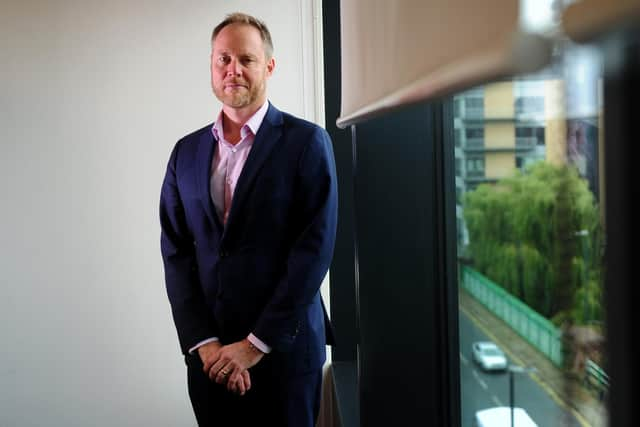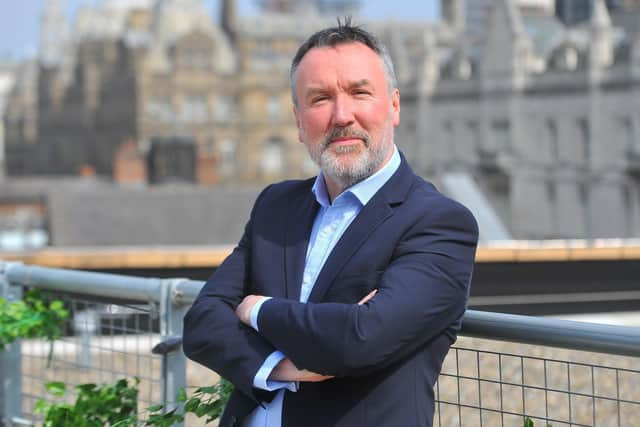Is Leeds in danger of becoming a City Divided despite tech sector boom?
and live on Freeview channel 276
But, is it only a certain quota of the city’s population that benefits - and how is the sector being impacted and restricted by other issues?
With the General Election looming, Emma Ryan asks two experts to put their cards on the table and tell the new government what needs to change.
Advertisement
Hide AdAdvertisement
Hide AdStuart Clarke is the director of the Leeds Digital Festival which this year attracted 25,000 people.


He told the Yorkshire Evening Post: “The tech sector in Leeds and the city region is growing faster than ever. Every day I speak to owners and managers of tech firms and they talk of new products, increased sales and revenues, and more jobs being created. There are hundreds of vacancies for well-paid jobs ranging from developers to designers to account managers. Firms are advertising all over the UK for people to move to Leeds to take up these roles.
“However, despite this growing success and wealth in the sector, we are in danger of becoming a city divided. There are areas in Leeds that have been excluded from this digital dividend and it’s important that tech firms give young people in those areas a helping hand, to connect them with the training and jobs available. Leeds is in many ways a prosperous city but we don’t always share that prosperity.
“Devolution would give the councils in our region extra powers and funding for skills and education to develop training and encourage access to the tech sector, working alongside tech firms as well as organisations like the “Ahead Partnership, with their Ahead in Digital campaign. A more diverse industry is important, as tech products and services need to reflect the people who use them; drawing talent from a wider pool is key to give access to jobs for everyone in the city.”
Devolution
Advertisement
Hide AdAdvertisement
Hide Ad

Mr Clarke also underlined the opportunities afforded by devolution and how devolved powers could improve the city’s infrastructure to support future growth.
“Devolution would also encourage extra investment into smart cities which would improve the lives of everyone in Leeds, using digital infrastructure to further develop growth, skills, jobs and public services. Devolution powers would bring much-needed transport and infrastructure improvement as well as support skills development, both of which would help to transform the productivity and growth of Leeds which would benefit the entire population of the city and surrounding areas.”
It comes after the YEP looked at manifestos on social inequality, health, transport and education.
Elsewhere, Richard Flint, a former chief executive of Skybet, argues that while the talent, vision and ambition among people in the industry in Leeds is as strong as ever, there is a ceiling on the growth because of the city’s physical infrastructure.
Advertisement
Hide AdAdvertisement
Hide Ad

He says: “The tech sector in Leeds is a huge recent success story, but perhaps in typical Yorkshire fashion, this hasn’t really been shouted about. According to The Information Age, Leeds’ digital sector contributes £6.5 billion to the City Region economy and employs 102,000 people, while achieving the fastest scale up growth in any city in the North. This is without even considering recent investment announcements from Channel 4 and Sky – high profile stories that will cement the City’s reputation as one of the best places to start or grow a tech business.”
Mr Flint said the city had a wealth of talent and had become a “tech hub”.
He said: “Having grown Sky Betting and Gaming from a single room in Harrogate to employing over 1,500 people in Leeds and Sheffield, I personally know the many strengths of Leeds as a tech hub: the talent is here, developed by Yorkshire based companies and entrepreneurs over decades, and augmented by our outstanding local universities. Digital connectivity is good helped by long term investments from AQL and others. There are loads of great real estate close to the centre, such as MEPC’s Wellington Place site. And our beautiful local countryside helps make the Leeds area a great place to live and - for some - to raise a family.
“But I think we all know that some things can and should be better. It’s becoming a cliché, but our transport infrastructure in the North is nowhere near good enough, even following recent rolling stock improvements. For me, the biggest issue is the rail connectivity between our northern cities and other conurbations and hubs. The journey times, frequency, reliability and quality of service between Sheffield, Leeds and Manchester (Airport). Just choosing one example – to get from Guiseley to Manchester Airport, a distance of under 60 miles, usually takes over 2 hours and it’s impossible to get there in time to check in for any international flight leaving before 10 am. This means that staff working internationally often have to stay an extra night at the airport the night before their trip, and over time this becomes a heavy burden on work and family life. Similarly, even with a central Leeds office location, it’s hard for businesses like Sky Betting and Gaming to recruit from the suburbs of Manchester and Sheffield – places with a high concentration of people with tech skills.
Advertisement
Hide AdAdvertisement
Hide Ad"So my biggest wish for the Leeds tech sector is for the next government to focus on improving rail transport between our northern cities. Improvement will take a long time, but like with most journeys, the earlier we start, the earlier we will get there.”